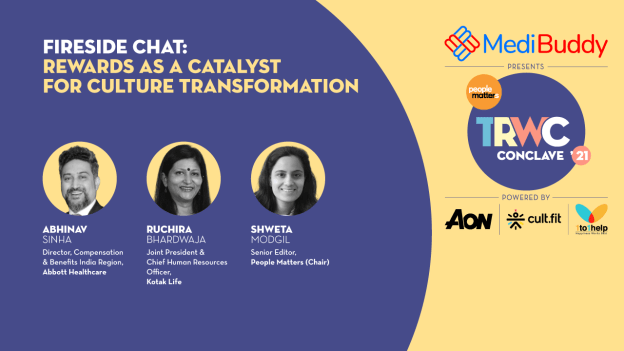Utilising rewards as a catalyst for culture transformation

The pandemic brought about dire changes and new challenges in the world of work. The hybrid workplace forced organisations to reinvent the tenets of employee engagement, continuous feedback, and the overall rewards strategy, to cultivate a productive and inclusive culture.
At People Matters Rewards and Wellness Conclave 2021, talent leaders discuss how rewards can be utilised as catalysts to drive culture transformation in the new era of work.
A New Rewards Paradigm Emerges
Rewards is no longer only about compensation, there is a renewed outlook towards compensation philosophy from a total rewards perspective i.e. a rewarding career, family time, coaching conversations, wellness and wellbeing etc. Ruchira Bhardwaja, Joint President & Chief Human Resources Officer, Kotak Life shares, “At Kotak, we believe in philosophies such as workcations and self-care days. Gone are the days of once-a-year rewards inputs; one-size-does-not-fit-all has gained momentum post the pandemic”. Abhinav Sinha, Director, Compensation & Benefits India, Abbott Healthcare talks about how it is important to strike a balance between transactional and relational rewards. Rewards philosophy should start with analysing the cash compensation at market, building the overall benefits bucket, and adding on relevant offerings such as mental health. Rewards must factor in what employee wants at various stages of their work-life and provide employees choice. “At Abbot we have a structured wellness and a mental health program which is pre-emptive, educative, informative and upholds confidentiality”, says Abhinav.
Indeed, these are interesting times for rewards professionals and CHROs, as rewards take on a more holistic nature.
Challenges to the Changing Face of Rewards
In the post-pandemic recovery phase, we are seeing the Great Resignation, with companies trying to attract talent by paying market-comparable cash. This approach comes with its own challenges, such as resource constraints. Rewards professionals are in a fix whether to wait and relook at long-term rewards philosophy or to tap into the low-hanging fruits as a quick fix to eliminate these issues. The answer involves a mindset shift, especially with respect to hybrid working. During the pandemic, mindsets have undergone a shift to some extent, but this should sustain the emerging hybrid-led rewards framework. “We did not lose productivity when we went remote, but now we need to address manager mindsets once people are back in the office”, shares Abhinav. For this, rewards professionals need to encourage dialogue around wellness, despite the enigma and taboo around these elements.
Driving Culture Change with Rewards
Many factors have undergone a change for employers and rewards professionals over the past few months- 2020 was about wage cuts and then wage recoveries, while July 2021 saw major lifestyle upgrades. Companies need to adapt by creating quick, customized and nimble rewards solutions. This is possible by putting in place the right cultural tenets such as welfare, health, safety, wellbeing etc. Ruchira shares that the core of the rewards-driven culture change will be centred on the budgeting process, which will now require the Rewards Head, CHRO, CXO and the Board to come together and move towards quick and relevant solutions rather than the erstwhile annual exercise. “There is no rewards strategy as a quick fix, rewards cannot be reactive, the outlook needs to be 3-4 years, with built-in sensibilities”, shares Abhinav.
A sustainable and relevant rewards strategy must have linkage with the core purpose of the company. “Go back to the first principle of rewards and outline what it means for every individual, not just for team, function or company”, quips Ruchira. Abhinav believes that creating a sustainable rewards-driven culture starts with knowing “what is it that you are paying for” and “what is your ability to pay”. For this, leaders must stop looking at rewards as a linear and unidimensional process, and must converge diverse aspects such as health, wellness, learning, coaching, flexibility etc. A great rewards culture is one that pushes employees to start thinking about their lifestyle elements, and HR must marry this with business sense and profitability angle. Managers can play a big role here, in retaining talent by propagating a culture of empathy.
“I hope culture will be the differentiator from one company to the other”, says Ruchira.










